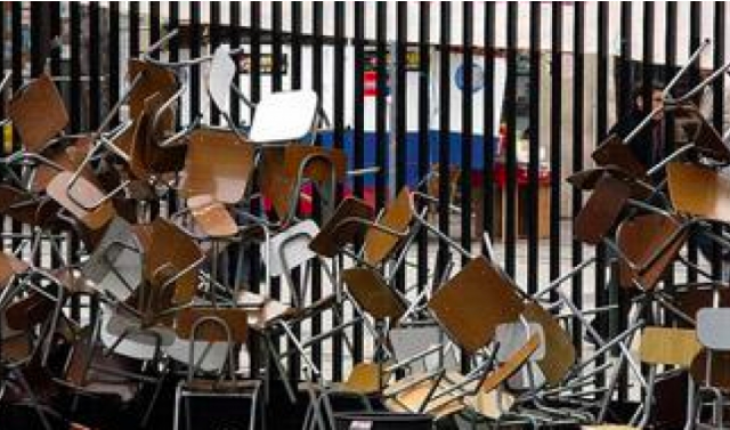As in any conflict, the student mobilizations that live relatively frequently the educational sector chil Eno raise the relationship between the aims and the means used to achieve them. There are those who argue that the gratuity of which much of the higher education students benefit today was well worth six months of paralysis of much of the public and private campuses in 2011. Or that to sign protocols that safeguard the rights of those who are sexually assaulted, have been paralyzed for weeks dozens of faculties in many other universities in 2018. For others, the nature of some strategies employed and the extent of their academic costs overshadow the purposes of demands.
The landscape of student mobilizations in Chile is known and recurrent. Occupied faculties, blocking of the accesses to the campus, thin walled made to professors and students, hundreds of anonymous drivers stuck in gigantic tacos, people complicated in their work, obligations that cannot be fulfilled, responsibilities prevented of Assume. In each of these episodes of force there are thousands of indignants, where there could be no sentiment but for full adherence to student demands. So, there are plenty of reasons to add to the just requests from students, but they are missing to adhere to their strategies when they are violent.
Surely the famous Florentine, Machiavelli, would resolve that the ends justify the means. It is true that, in theory, the safest thing is that we all Declararíamos Antimaquiavélicos arguing that it is better to solve the problems with reason and with reasonable means and not resorting to any ruse. It is difficult to understand the claim of respect for rights if this respect is not practiced.
The dilemma becomes a Gordian knot if pressure measures become the very fabric of the conflict, something like when the use of force seems to transform itself into an end in itself. For example, when the taking of a faculty is written before the request of demands or that the list of outrageous situations. That is, first comes the taking of a faculty and days later the reasons are known. This happens on a few occasions. In these cases, the way forward to the resolution of the conflict will be made more difficult and those who are run over in their rights are forced into the conflict “by secretariat”.
The issue then is, if it is legitimate to use a dubious means to achieve honorable purposes. And I say doubtful because the legitimacy of certain resources used in social mobilization, such as the taking, is questionable when violate the rights of the academic community and citizenship. This situation points to the recognition of rights. Hanna Arendt, from her experience of persecution and terror, already sentenced him: The first right is to have rights, Even those who do not share the aims or means of student mobilizations. Not respecting the rights of others leaves a moral damage in the academic community, in society and, of course, in those who commit them.
It seems to me that there is an association between conflict and violence in Chile that is not natural but perhaps cultural. This makes it dangerous, because we run the risk of normalizing it in democracy as an expression of the use of our freedom. But violence is nothing more than a weapon of ideological imposition and violation of the rights of the other.
The danger also for a future healthy living in the campuses is the existence of an irresponsible habit in use between part of the academic community. Be as they are and last as long as the conflicts last, at the end of the agreements “here peace and after Glory”. The indignation of the majority of the academic community for the abuses of their rights gives room to the urgency to recover the lost university activities. And that is when conflicts with violence become a chapter of a predictable saga about whose episodes we do not have time to reflect.
In the student and feminist movements that we have experienced in Chile in recent times, it is not enough to be indignant about abuses towards students or women. Nor is it enough to be indignant about the violation of the rights of those who oppose the use of violent means, such as taking or spontaneous street cuts. When the calm returns should work all the academic community to establish agreements or to fix protocols of action in case of conflict, to prevent it, to coexist civilized when it explodes, to serve it, to leave it. It is time then to sit down and talk about those minimum rules of coexistence in the conflict. Those minor civilisations that ensure the inviolable rights of each and every one of us when we face each other. This is a set of minimum rights and situations that prevent the dark side of Machiavellian injustice in the event of conflict, which is generated when the ends justify the use of any means. Consensus on these minimums would prevent fair demands and the honesty of complaints from acompañasening from unfair episodes.
Perhaps it would be useful to create on campus an open space for the permanent debate of all kinds of ideas, a sort of Speakers Corner London where the meeting is guided by university principles: discussion, knowledge, respect and objectivity. It is not an easy business, especially because it challenges us to think about the limits of our freedom of action and to take charge, as Sartre taught us, of our responsibility as individuals beyond the movement and causes them to adhere. Nor is it easy because disenchantment towards politics makes the air of mistrust that separates the citizens and the students of their authorities more dense. And yet from the classrooms, we should not abdicate our role as trainers in civic education. The university is a file of knowledge, of culture, of civics, of communication skills. At the end of each conflict we should treasure more wisdom if we have learned our lesson.
I am convinced that social movements have not given the best they can give in defending the rights of students and women. The courage they have shown is also needed in the non-violent resistance of the fight against abuse. Others outraged before them demonstrated that it is possible, that social transformation and violent means do not go hand, that firm determination and non-violent strategies can lift waves. Buffy Sainte-Marie, achieved a revolution with her guitar. And the White Rose group fighting Hitler from underground lifted thousands of citizens with their pamphlets.
To finish shaking that sticky maximum Machiavellian, allow the Rector Unamuno to make a turn of those sublime words that blurted out fascism from the Salamanca classrooms. Much I fear that, violate the rights of others as it happens in a takeover, student deeds may convince a few, but will not expire. For it could not be victorious a revolution with many fallen: the rights of many, the quality of education of all, the image of public education
The content poured in this opinion column is the sole responsibility of its author, and does not necessarily reflect the editorial line or position of the counter.





